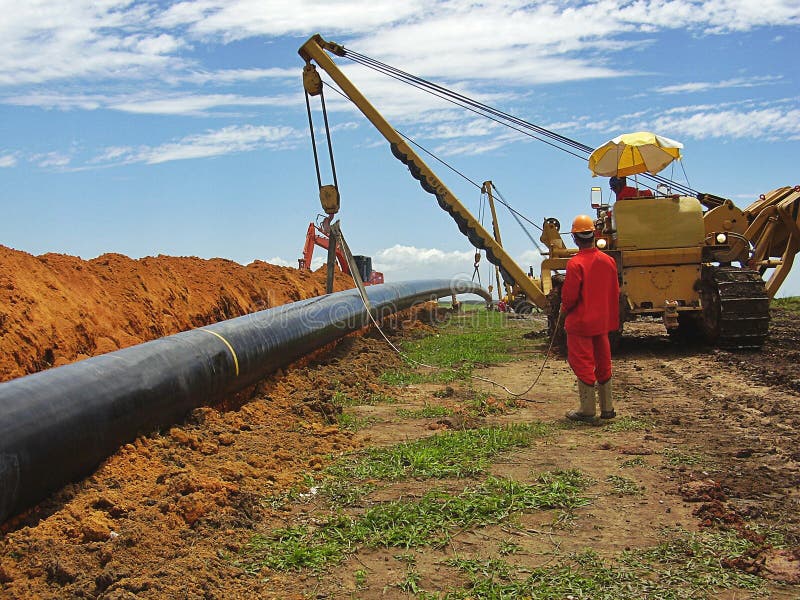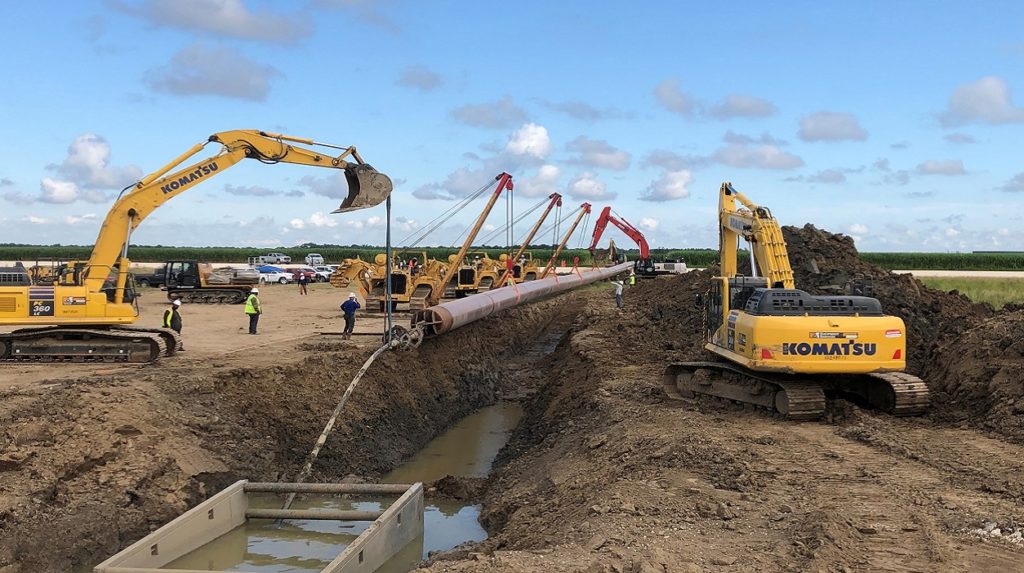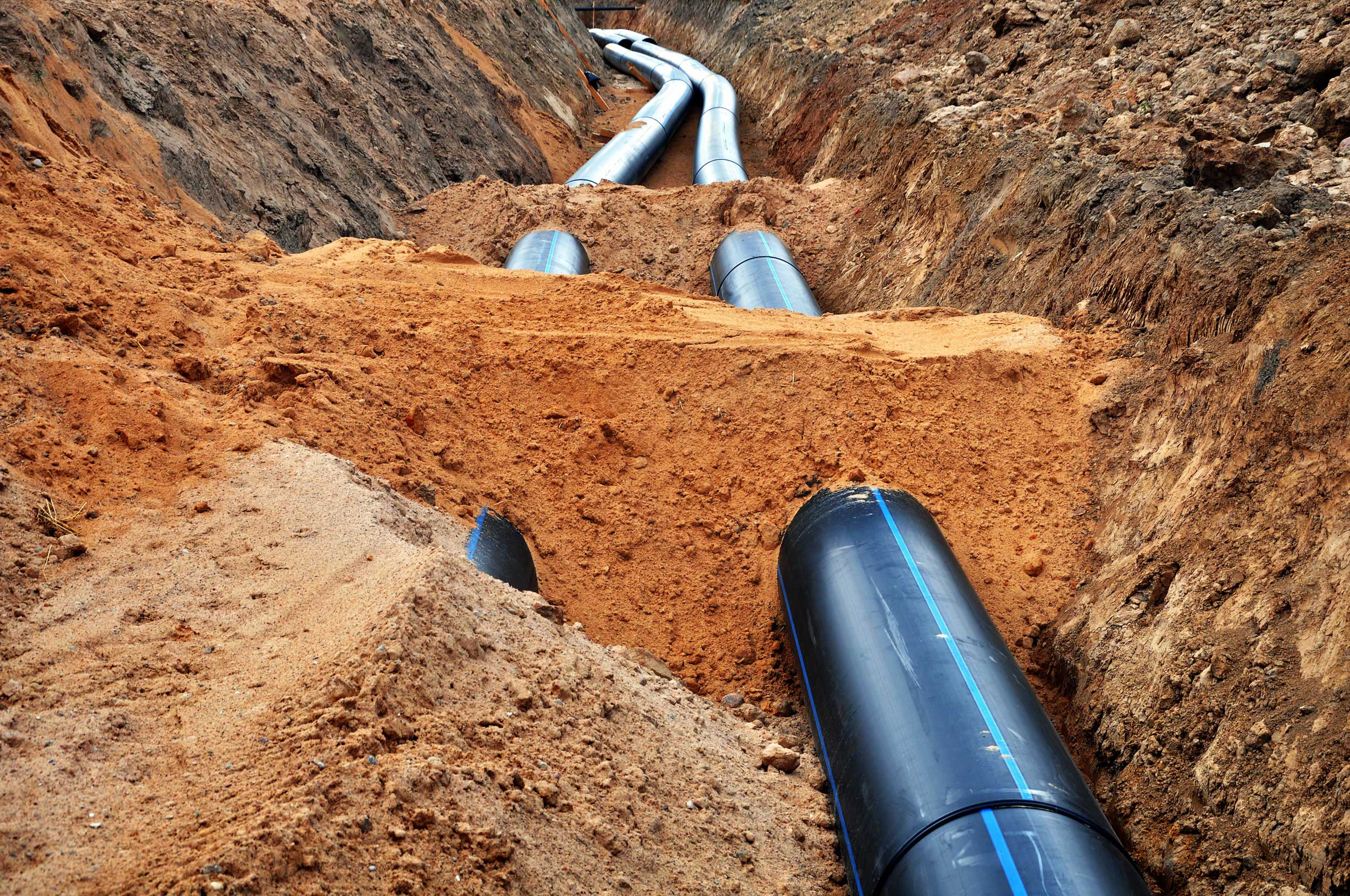Reinventing Pipiline Construction: Cutting-edge Techniques for a Sustainable Future
The landscape of pipiline construction is undertaking a considerable makeover, driven by the need for sustainability and effectiveness. Arising innovations, such as innovative products and smart systems, present possibilities to reduce ecological effect while boosting functional reliability. In addition, the assimilation of environment-friendly methods and area interaction is reshaping the traditional approaches to framework development. However, the question remains: exactly how can these advancements be efficiently executed to guarantee not just the long life of pipelines however additionally the health and wellness of the environments they traverse? Exploring this junction may expose important understandings for the market's future.
Advanced Materials in Pipiline Construction
Recently, countless developments in materials scientific research have actually greatly changed pipiline construction, enhancing both longevity and efficiency. The introduction of high-performance materials has played a critical duty in resolving the difficulties connected with conventional pipiline systems, including deterioration, wear, and leak. For example, the advancement of advanced composite materials, such as fiberglass enhanced plastic (FRP) and carbon fiber compounds, has caused pipelines that are not only lighter but additionally exhibit remarkable resistance to environmental tensions and chemicals.Additionally, the application of polyethylene (PE) and polyvinyl chloride (PVC) has actually gotten traction due to their superb corrosion resistance and simplicity of installation. These products markedly decrease upkeep prices and prolong the life span of pipes. In addition, advancements in covering innovations, such as fusion-bonded epoxy and progressed polymer coatings, offer added defense against rust and mechanical damages, ensuring the stability of pipes in rough conditions.In enhancement, the assimilation of smart products that reply to environmental changes is emerging as a promising advancement. These materials can discover stress and anxiety and pressure, giving real-time information that can improve safety and functional performance. By making use of these innovative materials, pipiline construction not just meets existing sector requirements however likewise advertises sustainability with reduced source intake and reduced ecological effect
Smart Innovation Integration
Smart modern technology combination is changing pipiline construction by enhancing surveillance, safety and security, and functional effectiveness. The adoption of Internet of Things (IoT) devices, artificial knowledge (AI), and progressed information analytics has actually changed standard methods, supplying real-time understandings right into pipiline systems. These innovations enable continuous monitoring of pipiline conditions, allowing early discovery of potential concerns such as leaks or structural weaknesses.For instance, clever sensing units installed within pipiline infrastructure can relay essential data pertaining to pressure, temperature, and circulation rates, helping with aggressive upkeep and decreasing the risk of disastrous failings. AI algorithms examine this information to anticipate maintenance needs, maximizing functional routines and minimizing downtime. This anticipating ability not only improves the longevity of pipiline systems however additionally significantly reduces functional costs.Moreover, the assimilation of drones and robotic technologies right into pipiline construction and maintenance offers significant advantages. Drones furnished with high-resolution electronic cameras and thermal imaging capacities can conduct airborne inspections of pipelines, determining abnormalities that might be undetectable from the ground. Robot systems can be released in harmful settings, making sure that human workers are maintained out of injury's way while still carrying out essential tasks.Incorporating wise modern technology right into pipiline construction cultivates a culture of security and efficiency, ultimately leading to minimized ecological effect and boosted job timelines. As industry stakeholders remain to embrace these innovations, the future of pipiline construction appears significantly interconnected, data-driven, and resilient.

Eco-Friendly Construction Practices
As the concentrate on ecological sustainability intensifies, the pipiline construction industry is increasingly adopting environment-friendly techniques. This includes the usage of lasting products, techniques to lessen ecological impact, and energy-efficient techniques that improve overall task feasibility. By executing these practices, business can not just lower their ecological impact however also enhance their operational performance.
Lasting Materials Usage

Reducing Ecological Influence

Energy-Efficient Methods
While pipiline construction naturally entails substantial power intake, taking on energy-efficient methods can considerably reduce the general energy footprint of the job. Executing innovative innovations, such as automated equipment and drones, streamlines procedures, reduces waste, and guarantees precise implementation, thereby reducing power use throughout construction.Utilizing sustainable products, such as recycled steel and low-carbon concrete, further improves energy efficiency. These materials not just reduce the power needed for manufacturing however also reduced the general environmental effect of the pipiline. Additionally, enhancing transport logistics by making use of regional distributors and lessening transportation ranges can significantly lower fuel consumption.Incorporating renewable resource resources right into construction processes is one more critical approach. Using solar-powered devices and generators can lower reliance on fossil fuels, advertising a greener construction site.Moreover, labor force training and education on energy-efficient practices can lead to more conscientious decision-making on-site, cultivating a culture of sustainability. By integrating these energy-efficient techniques, the pipiline construction market can not only lower its carbon exhausts but additionally established a criterion for future projects, aligning with international initiatives towards an extra lasting facilities.
Decreasing Environmental Effect
Lessening environmental effect throughout pipiline construction is vital for sustainable development - Permian Basin Pipeline Solutions. This can be accomplished with the adoption of green products, the execution of innovative trenchless technology, and the application of habitat conservation strategies. By concentrating on these key locations, the industry can considerably minimize its ecological impact while keeping operational performance
Eco-Friendly Materials Adoption
As the pipiline construction industry encounters boosting examination over its environmental impact, the adoption of eco-friendly products has actually become a crucial method for minimizing eco-friendly impact. By incorporating sustainable resources into construction processes, business can significantly minimize air pollution, preserve natural deposits, and boost the total sustainability of their projects.Innovative materials such as recycled plastics, bio-based compounds, and low-carbon concrete are being checked out to change traditional options that commonly add to ecological degradation. For circumstances, recycled plastics not only lower waste but additionally offer resilience and versatility, making them ideal for numerous pipiline applications. Bio-based compounds obtained from eco-friendly websites sources offer a lower carbon footprint contrasted to traditional materials.In enhancement to product selection, firms are significantly prioritizing life cycle assessments to review the environmental effects of their options. By examining the entire life cycle-- from extraction to disposal-- companies can make informed decisions that align with sustainability goals.Ultimately, the commitment to environment-friendly materials is not merely a pattern however a necessary advancement within the pipiline construction sector. Accepting these lasting techniques fosters a much more liable method to infrastructure development, leading the way for a greener future.
Advanced Trenchless Modern Technology
Just how can progressed trenchless modern technology change pipiline construction? This cutting-edge method minimizes ecological impact by considerably reducing surface area disturbance throughout installation. Conventional pipiline construction methods commonly need extensive excavation, resulting in habitat damage, soil erosion, and raised sedimentation in close-by water bodies. In comparison, trenchless strategies, such as straight directional boring (HDD) and pipeline bursting, permit the installation of pipelines with very little ground disturbance.These approaches entail producing a borehole underground, allowing the installation of brand-new pipes without the demand for big trenches. Consequently, progressed trenchless innovation not just preserves existing landscapes but likewise reduces the carbon impact connected with heavy equipment and transport. In addition, these methods can be he has a good point applied in city locations, where room is minimal and the potential for ecological injury is heightened.Furthermore, trenchless innovation is versatile to various soil problems, making it a functional remedy for different geographical contexts. By incorporating innovative trenchless approaches right into pipiline construction practices, the market can lead the way for more sustainable advancement, guaranteeing that framework satisfies contemporary demands while protecting the stability of the setting.
Habitat Conservation Techniques
Sustainability in pipiline construction rests on reliable environment conservation techniques that focus on ecological honesty. These strategies are essential in minimizing the environmental impact related to pipiline tasks, making sure that local wildlife and communities are guarded throughout the construction process.One essential strategy involves carrying out extensive ecological impact assessments (EIAs) prior to task initiation. EIAs recognize sensitive habitats and types that might be impacted, enabling construction teams to develop tailored reduction plans. In addition, executing buffer areas around critical habitats can significantly decrease disturbances, giving a refuge for wild animals during construction.Another reliable approach is making use of directional boring and other trenchless innovations, which lessen surface area disturbance by allowing pipes to be installed under delicate locations, such as wetlands and rivers. This technique not just safeguards breakable environments however additionally lowers the demand for comprehensive land clearing.Additionally, using native plant life for repair post-construction is important in advertising biodiversity. By reintroducing species that are indigenous to the area, the ecological community can recuperate better, ensuring that both the environmental and visual values of the landscape are maintained. Eventually, these environment preservation techniques add to an extra sustainable and responsible technique to pipiline construction.
Enhancing Precaution
While the need for pipiline construction continues to climb, prioritizing safety and security procedures has never been even more important. As the sector evolves, the execution of innovative security procedures and innovations has actually ended up being necessary to mitigate threats linked with pipiline installation and maintenance.One of the leading strategies includes the adoption of extensive training programs for personnel. Confirming that employees are skilled in safety procedures, emergency reaction methods, and the procedure of specialized equipment is critical. Normal drills and simulations can improve their preparedness for unforeseen circumstances, therefore reducing the likelihood of accidents.Additionally, the combination of cutting-edge technology, such as drones and remote monitoring systems, plays a significant role in security improvement. Drones can carry out aerial assessments, recognizing potential risks and enabling for real-time evaluations without putting workers at threat. Remote monitoring systems can detect leakages or abnormalities in pipiline systems, facilitating prompt treatments and minimizing ecological impact.Moreover, the facility of a robust security culture within organizations cultivates responsibility and cumulative duty. Motivating open interaction regarding safety problems and entailing all employee in the growth of safety procedures can cause an extra cautious workforce.Lastly, conformity with market requirements and regulations is vital. Normal audits and evaluations validate adherence to security guidelines, helping with continual enhancement in safety and security efficiency. By welcoming these measures, the pipiline construction sector can greatly enhance safety, confirming the defense of employees, neighborhoods, and the environment.
Partnership With Local Neighborhoods
Effective pipiline construction not only depends upon precaution however also thrives on promoting positive partnerships with local neighborhoods. Involving regional stakeholders is important for the successful execution of pipiline tasks, as these communities commonly hold useful understandings and worries concerning environmental, social, and economic effects. Building depend on through clear communication can alleviate resistance and enhance project support.Collaboration with neighborhood neighborhoods starts with early appointment. By entailing homeowners in the preparation phases, pipiline companies can gather responses and address details worries related to land use, prospective ecological effects, and neighborhood safety and security. This aggressive strategy demonstrates regard for local expertise and fosters a sense of ownership amongst community members.Furthermore, pipiline tasks can produce regional task opportunities, consequently adding to economic advancement. Business ought to prioritize hiring local labor and having regional services whenever feasible. This not only supports the area however additionally reinforces connections, as neighborhood workers usually have a vested rate of interest in the job's success.Environmental stewardship is an additional vital consider collaboration. Involving with local ecological teams can help recognize and implement lasting techniques that lessen environmental disruption. This teamwork can result in innovative services that align job objectives with community worths.
Future Trends in Pipiline Design
As the pipiline market progresses, numerous patterns are shaping the future of pipiline design. One of one of the most substantial trends is the combination of innovative modern technologies, such as fabricated intelligence (AI) and the Web of Things (IoT) These modern technologies enable real-time monitoring and anticipating upkeep, boosting the effectiveness and safety and security of pipiline procedures. AI formulas can assess huge quantities of information, determining potential issues prior to they intensify right into pricey failures.Another trend is the raising focus on sustainability and environmental stewardship. Engineers are adopting innovative products and construction techniques that reduce ecological effect, such as making use of bio-based compounds and trenchless technologies. These approaches not just lower land disturbance yet additionally decrease the carbon impact of pipiline projects.Furthermore, governing structures are shifting in the direction of much more rigorous environmental and safety standards, prompting designers to focus on conformity and risk monitoring in their styles. The use of digital twins-- digital reproductions of physical properties-- has become an essential device for optimizing pipiline style and operation, permitting enhanced simulation and situation analysis.Collaboration throughout markets is also increasing, promoting collaborations in between pipiline firms, innovation service providers, and ecological companies. This participating strategy assists in the sharing of best techniques and ingenious options, eventually bring about even more durable pipiline infrastructure.As the sector moves onward, these patterns will certainly play a crucial duty fit the future of pipiline engineering, making sure that it meets the needs of a quickly changing world while prioritizing security and sustainability.
Regularly Asked Concerns

Just How Do Pipiline Construction Techniques Affect Resident Wild Animals Populations?
Pipiline construction techniques substantially affect local wild animals populaces by modifying environments, disrupting migration patterns, and presenting pollutants. Carrying out ecologically mindful methods is necessary to reduce these effects and hop over to here promote conjunction in between framework development and wildlife conservation.
What Are the Expenses Connected With Innovative Pipiline Construction Approaches?
Ingenious pipiline construction methods typically entail higher ahead of time costs because of innovative technology and products. These investments can yield long-lasting cost savings with enhanced performance, lowered ecological effect, and reduced upkeep costs, inevitably profiting stakeholders.
Just How Is Public Viewpoint Changing In The Direction Of Pipiline Construction Projects?
Public viewpoint in the direction of pipiline construction tasks is increasingly crucial, driven by ecological concerns and a demand for transparency (Pipeline Construction Excellence). Areas currently focus on sustainability and safety, prompting stakeholders to take on even more accountable methods and participate in significant dialogue with the public
Exist Specific Regulations Governing New Pipiline Technologies?
Yes, details regulations govern brand-new pipiline innovations, varying by region and nation. These guidelines generally focus on safety and security, environmental influence, and technical criteria to assure compliance with legal requirements and public safety.
What Function Do Universities Play in Advancing Pipiline Construction Techniques?
Universities play a crucial function beforehand pipiline construction techniques by conducting study, creating cutting-edge modern technologies, working together with industry companions, and offering education. Midland Pipeline Construction Authority. Their payments promote understanding transfer and promote lasting methods within the pipiline sector